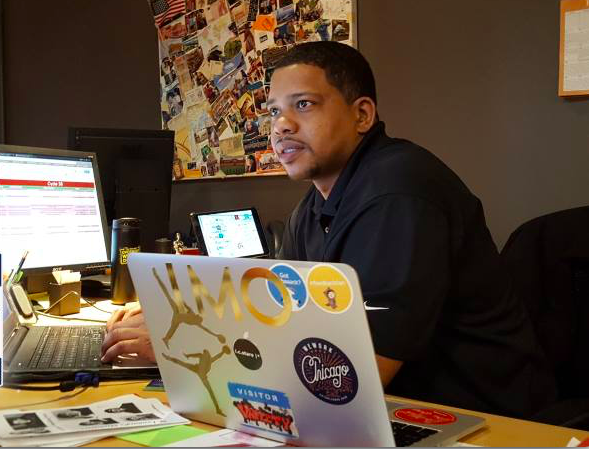
Rico Bryant, like many formerly incarcerated people, isn’t defined by his past
Rico Bryant is the Recruitment Manager of i.c.stars, a technology-based workforce development program assisting low-income adults. One of the pillars that i.c.stars touts is its leadership training, how it helps people from underserved communities tap into their potential and grow into forward-thinking leaders. The 33-year-old Bryant knows this well. He was once an i.c.stars intern, finding out about the company through a Facebook post and going on to rise up the ranks there. Bryant describes stumbling upon this random social media post as “a blessing from God,” as he was searching for work and continually having doors slammed in his face, all because he had been incarcerated.
Bryant, who was raised in housing projects on Chicago’s south side, described his upbringing in ways that are plainspoken yet illuminating. “It was just up and down crisis,” said Bryant, “I was stuck in my environment, and I went through the same things that my family went through,” noting that he lost family members to gun violence, and currently has a cousin who is incarcerated. These systemic issues led Bryant to get caught in a mindset of, as he describes it, “fast money,” never taking on a proper job and finding himself stuck in cycle of going back and forth to jail. But it was his final stint, and his longest prison sentence, that Bryant would say changed his life.
“It was an eye-opener, because it was a situation I’d gone through numerous times in my life,” said Bryant. “I was surviving, but I couldn’t get a job because I had a blank [job] history. I went to college for a short period of time. And I’d been a ward of the state, too.” His struggle to find work was indicative of the path many people find themselves in after being released from prison. A 2016 policy brief from the National Employment Law Protection advocacy group stated that between 60 and 75 percent of people recently released from prison are unemployed for their first year after release. The NELP briefing goes on to say that, more often than not, the work people can find after release is too small of a wage for them to support their families, with prison time, on average, lowering wages by up to 20 percent.
Though it has been demonstrated that formerly incarcerated individuals perform at the same level—if not higher—than those without a criminal background, as CNN highlighted, the proliferation of job applications asking about criminal history makes it easier for employers to disregard an applicant sight unseen. These factors make it so it’s not only hard for people such as Bryant to find reliable work that pays a living wage, it contributes to the fact that nearly 50 percent of the formerly incarcerated return to prison within their first three years after their release. Even with tax credits and federal bond programs offered to employers that hire those with criminal records, this part of the application—colloquially known as “the Box”—remains a hurdle.
But despite these challenges, Bryant remains transparent about his past, not just because he knows that he’s changed, but because he believes that, by being open about his experience, people in hiring positions will no longer use prior convictions as a means of disqualifying someone from a job. “We don’t want people to hold their story against them,” said Bryant, “That’s a thing that goes on, and [employers] need to let it go.” He noted that, i.c.stars employs between 10-to-15 percent of people in this demographic—and has co-presented an event on this very topic with Cara and Chicago Ideas—not everyone in the organization can be as vocal about their past. Bryant’s status within i.c.stars allows him the unique opportunity to speak openly about his past, while showing that, like many of his peers, those past indiscretions don’t define him.
The mission of i.c.stars is one that falls in line with what formerly incarcerated people need when re-entering the workforce. The barriers to entry are relatively standard, calling for a high school degree or G.E.D., and six months of work experience, following by a 12-hour assessment process testing critical thinking skills, creativity and resiliency characteristics. If selected for an internship, it offers not just a stable income, but also stable work that can be put on a person’s resumé. On top of that, it prioritizes teamwork in a vital way. “At i.c.stars, our whole team is together,” said Bryant, noting that it humanizes people with criminal records while offering a new network of support.
As i.c.stars’ Recruitment Manager, Bryant’s work allows him to reach out to the communities he’s a part of, helping bring people from low-income areas, and those with criminal records, into the tech industry. “What am I supposed to do? Keep going through the oppression or stop the oppression?,” Bryant asks rhetorically. But that question highlights the struggles he’s faced. As Bryant works to bring in more people that share his experience, he sets an example that other businesses can follow.


